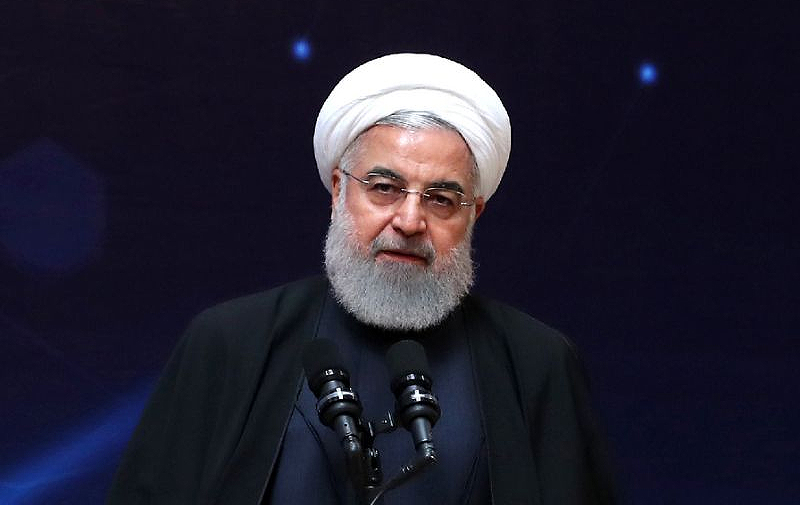GENEVA/DUBAI: Iran threatened yesterday to restart deactivated centrifuges and ramp up enrichment of uranium to 20 percent purity as its next potential big moves away from a 2015 nuclear agreement that Washington abandoned last year. The threats, made by Tehran’s nuclear agency spokesman, would go far beyond the small steps Iran has taken in the past week to nudge stocks of fissile material just beyond limits in the pact. That could raise serious questions about whether the agreement, intended to block Iran from making a nuclear weapon, is still viable.
The two threats would reverse major achievements of the agreement, although Iran omitted important details about how far it might go to returning to the status quo before the pact, when Western experts believed it could build a bomb within months. In a separate standoff, Iran’s foreign minister accused Britain of “piracy” for seizing an Iranian oil tanker last week. Britain says the ship was bound for Syria in violation of European Union sanctions.
Behrouz Kamalvandi, spokesman for Iran’s Atomic Energy Organization, confirmed that Tehran had enriched uranium beyond the deal’s limit of 3.67 percent purity, passing 4.5 percent, according to news agency ISNA. UN nuclear watchdog, the IAEA, confirmed it had verified Iran’s enrichment was beyond 3.67 percent. Iran has said it will take another, third step away from the deal within 60 days. Kamalvandi said options included enriching uranium to 20 percent purity or beyond, and restarting IR-2 M centrifuges dismantled under the deal.
Such threats put new pressure on European countries, which insist Iran must continue to comply with the agreement even though the United States is no longer doing so. French President Emmanuel Macron was sending his top diplomatic advisor to Iran today and tomorrow to try and help defuse tensions, a presidential official said.
Washington has imposed sanctions that eliminate the benefits Iran was meant to receive for agreeing to curbs on its nuclear program with world powers. The confrontation has brought the United States and Iran close to the brink of conflict, with President Donald Trump calling off air strikes last month minutes before impact. Enriching uranium up to 20 percent purity would be a dramatic move, since that was the level Iran achieved before the deal, although back then it had a far larger stockpile than it is likely to be able to rebuild in the short term. It is considered an important intermediate stage on the path to obtaining the 90 percent pure fissile uranium needed for a bomb.
One of the main achievements of the deal was Iran’s agreement to dismantle its advanced IR-2M centrifuges, used to purify uranium. Iran had 1,000 of them installed at its large Natanz enrichment site before the deal. Under the deal, it is allowed to operate only up to two for testing. Still, the threatened measures also appear intended to be sufficiently ambiguous to hold back from fully repudiating the deal. Kamalvandi did not specify how much uranium Iran might purify to the higher level, nor how many centrifuges it would consider restarting. He did not mention other more advanced centrifuges, including the most advanced, the IR-8. Iran has said all the steps it is contemplating are reversible.
The nuclear diplomacy is one aspect of a wider confrontation between Washington and Tehran that has threatened to spiral into open conflict since the United States tightened sanctions from May. “Let me be clear: Iran should not confuse American restraint with a lack of American resolve,” US Vice President Mike Pence said yesterday, reiterating Washington’s resolve to protect US personnel and citizens in the Middle East.
European countries do not directly support the US sanctions, but have been unable to come up with ways to allow Iran to avert them. Britain, one of Washington’s main allies, was drawn deeper into the confrontation last week when its Royal Marines seized an Iranian tanker entering the Mediterranean off Gibraltar over separate sanctions against Syria.
The tanker’s seizure “will not be tolerated by us and will not go without a response”, said Iran’s Defense Minister Amir Hatami, quoted by Iran’s ISNA and Tasnim news agencies. “This move is against international regulations and a kind of maritime piracy,” he said during a ceremony at Bandar Abbas port in southern Iran. The 330-m Grace 1, capable of carrying two million barrels of oil, was halted Thursday by police and customs agencies in Gibraltar, a British overseas territory on Spain’s southern tip. Authorities in Gibraltar said they suspected the tanker was carrying crude to Syria in violation of EU sanctions. Tehran
Gibraltar’s Supreme Court ruled Friday that the tanker can be held for 14 more days, the territory’s attorney general said. The government of Gibraltar said in a statement yesterday that the tanker was “well inside” British Gibraltar Territorial Waters when it was boarded, having “previously exited the international waters of the Straits of Gibraltar”. It released a screenshot along with the statement of a maritime map that showed the tanker’s location.
“Iran is neither a member of the EU nor subject to any European oil embargo. Last I checked, EU was against extraterritoriality. UK’s unlawful seizure of a tanker with Iranian oil on behalf of #B_Team is piracy, pure and simple,” Iran’s Foreign Minister Mohammad Javad Zarif tweeted yesterday, using ‘B team’ as a derisory term for the Trump administration.
Iran says the deal allows it to respond to the US breach by reducing its compliance, and it will do so every 60 days. Zarif also tweeted that world powers will not be able to negotiate a better deal than the 2015 nuclear deal. “#B_Team sold @realDonaldTrump on the folly that killing #JCPOA thru #EconomicTerrorism can get him a better deal,” Zarif wrote, referring to the deal by its acronym for the Joint Comprehensive Plan of Action. “As it becomes increasingly clear that there won’t be a better deal, they’re bizarrely urging Iran’s full compliance. There’s a way out, but not with #B_Team in charge.” – Agencies










